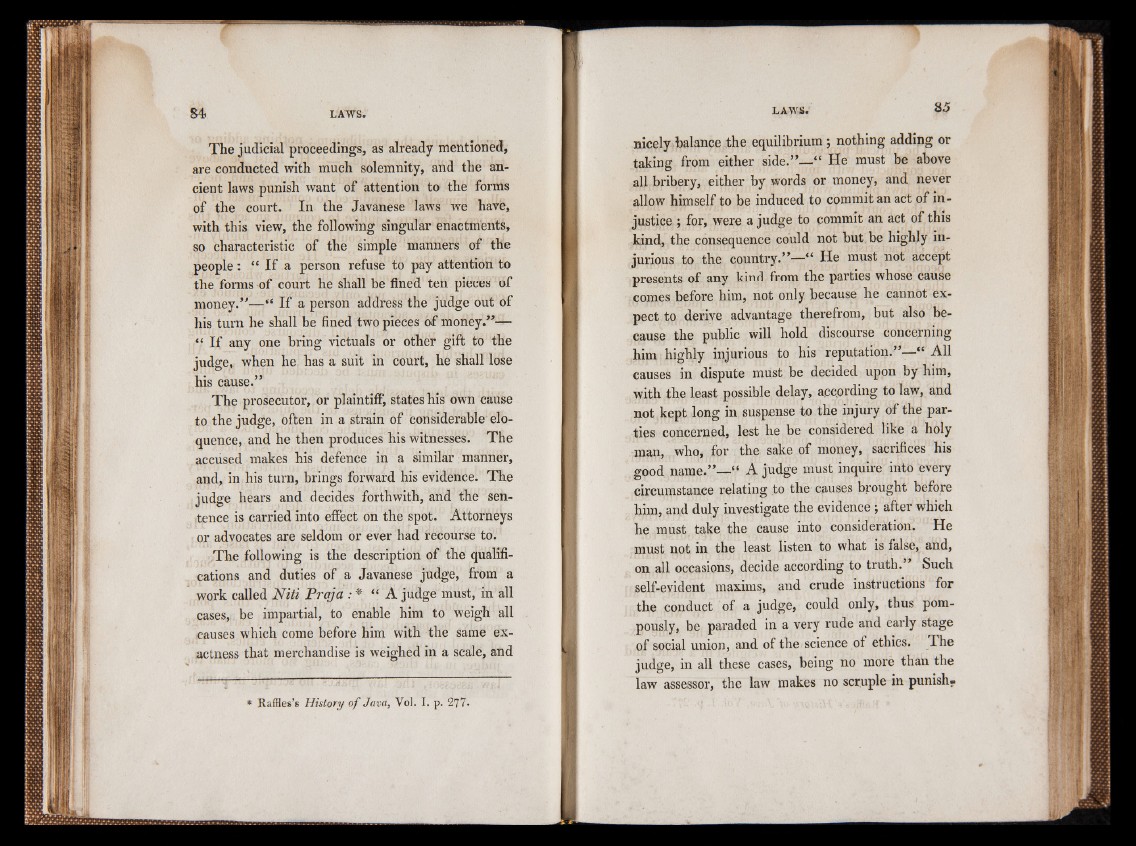
The judicial proceedings, as already mentioned,
are conducted with much solemnity, and the ancient
laws punish want of attention to the forms
of the court. In the Javanese laws we have,
with this view, the following singular enactments,
so characteristic of the simple manners of the
people: “ If a person refuse to pay attention to
the forms of court he shall be fined ten pieces of
money.”—“ If a person address the judge out of
his turn he shall be fined two pieces of money.”—
“ If any one bring victuals or other gift to the
judge, when he has a suit in court, he shall lose
his cause.”
The prosecutor, or plaintiff, states his own cause
to the judge, often in a strain of considerable' eloquence,
and he then produces his witnesses. The
accused makes his defence in a similar manner,
and, in his turn, brings forward his evidence. The
judge hears and decides forthwith, and the sentence
is carried into effect on the spot. Attorneys
or advocates are seldom or ever had recourse to.
The following is the description of the qualifications
and duties of a Javanese judge, from a
work called Niti Praja : * “ A judge must, in all
cases, be impartial, to enable him to weigh all
causes which come before him with the same exactness
that merchandise is weighed in a scale, and
* Raffles’s History of Java, Vol. I. p. 277.
nicely balance the equilibrium; nothing adding or
taking from either side.”—“ He must be above
all bribery, either by words or money, and never
allow himself to be induced to commit an act of injustice
; for, were a judge to commit an act of this
kind, the consequence could not but. be highly injurious
to the country.”—“ He must not accept
presents of any kind from the parties whose cause
comes before him, not only because he cannot expect
to derive advantage therefrom, but also because
the public will hold discourse concerning
him highly injurious to his reputation.”—“ All
causes in dispute must be decided upon by him,
with the least possible delay, according to law, and
not kept long in suspense to the injury of the parties
concerned, lest he be considered like a holy
man, who, for the sake of money, sacrifices his
good name.”—“ A judge must inquire into every
circumstance relating to the causes brought before
him, and duly investigate the evidence; after which
he must take the cause into consideration. He
must not in the least listen to what is false, and,
on all occasions, decide according to truth.” Such
self-evident maxims, and crude instructions for
the conduct of a judge, could only, thus pompously,
be paraded in a very rude and early stage
of social union, and of the science oi ethics. The
judge, in all these cases, being no more than the
law assessor, the law makes no scruple in punish